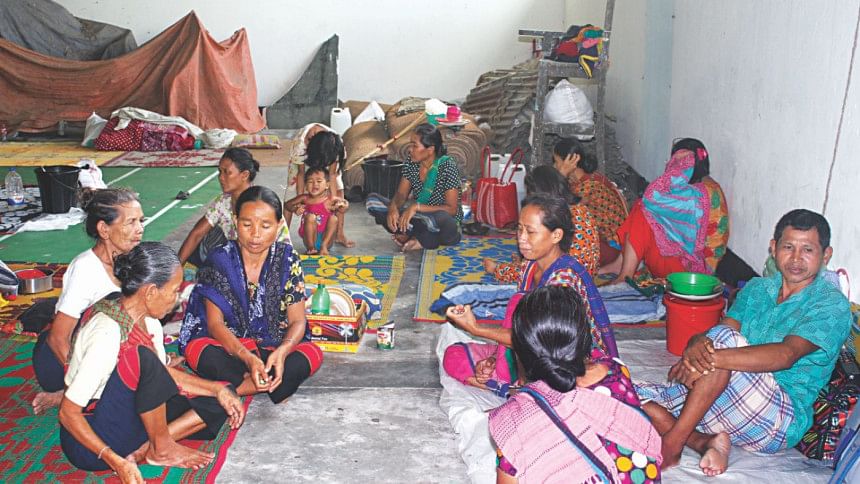Homeless people kept in wait

Over a month after the Rangamati landslides, the people, who were rendered homeless, are eagerly waiting for permanent settlement as the government is preparing a “comprehensive” policy for their rehabilitation.
Until yesterday, they were not allowed to build or repair houses as their land still remained vulnerable to the recurrence of the disaster.
The Rangamati district administration formed two committees on July 16 to prepare plans for the rehabilitation of the victims, many of whom have been staying at different shelters in the town since June 13.
On that day, landslides, the deadliest in recent times, killed at least 120 people and damaged some 1,300 homes in the district.
Fearing recurrence of the incident, the government forbade the district administration to allow anyone to live in the risky hill slopes. However, the administration now finds it difficult to rehabilitate the victims as there is hardly any plain land left in the town area.
Currently, about 1,500 people are living in seven shelters in the town, KM Ikhtiar Uddin Arafat, spokesman for the district administration disaster control room, told this correspondent yesterday.
The government formed a committee on June 15, comprising senior officials from different ministries and experts from different public universities and institutions, to work out plans for the rehabilitation in the quickest possible time.
The 27-member body, led by Satya Brata Saha, an additional secretary of the ministry for disaster management, were visiting the landslide-hit areas in the hilly districts and trying to find out the reasons behind the disaster.
The committee would also put forward recommendations to avert the loss of lives from future landslides. It would also identify the reasons of the recent landslides.
Based on the reports, the government would take necessary decisions in this regard, say officials.
“Unless we submit our report to the government, the homeless people will continue living in the shelters. The local administrations have been asked to ensure that the people don't return to their houses as they are vulnerable to landslides,” Satya Brata Saha told The Daily Star.
Asked, he said the report would be submitted “soon”.
Md Reaz Ahmed, director general of Department of Disaster Management, however, said the committee would submit its report in couple of weeks and they would go for the permanent rehabilitation of the victims on receiving it.
“We will not only rehabilitate them but will also prepare a comprehensive policy about preventing landslides in the hills. Besides, we will hold a major workshop on the matter and take opinions of all stakeholders,” said Reaz.
About the emergency response of the government, he said Tk 1.6 crore and 600 tonnes of rice were distributed among the victims immediately after the landslides.
Many development partners were showing interests in building houses for the victims. UNDP alone wanted to construct 1,500 houses for them, he said, adding that the government recons to include development partners in the initiative.
According to the ministry of disaster management, landslides have emerged as a major hazard.
Eighteen percent of the total area of Bangladesh is covered by hills. Human settlements and activities on the hill slopes make landslides lethal, a report of the ministry said.
Contacted, Rangamati Deputy Commissioner Mohammad Manzurul Mannan said they were still undecided about the rehabilitation plan.
“We are thinking about building different small villages to rehabilitate the victims. But we are not sure where they would be,” he said, adding that they were waiting for a government policy or decision to this end.
Prof ASM Maksud Kamal, chairman of Disaster Science and Management at Dhaka University, said their study identified the main reasons behind landslides as torrential rains, setting up of “risky” houses, roads and tube wells, cutting of trees and destruction of the ecological balance of the areas.
He said if certain natural characteristics of hills were harmed, they would “behave differently”. “The recent landslide was one of such behavior,” he told The Daily Star.
Settlers did not know how to use the hills. By doing different kinds of cultivations, the people from mainland made the hills vulnerable to disasters, he said.
The DU professor also said to make safe living in the hills, the law to this end must be implemented and punishments for violations also would have to be increased.
Prof Kamal said a total assessment from different perspectives must be done now to prepare plans for the future.
He also suggested community-based early warnings, which were piloted in Chittagong and Cox's Bazar's Teknaf under a comprehensive disaster management programme, should also be launched in the hilly areas.

 For all latest news, follow The Daily Star's Google News channel.
For all latest news, follow The Daily Star's Google News channel. 



Comments